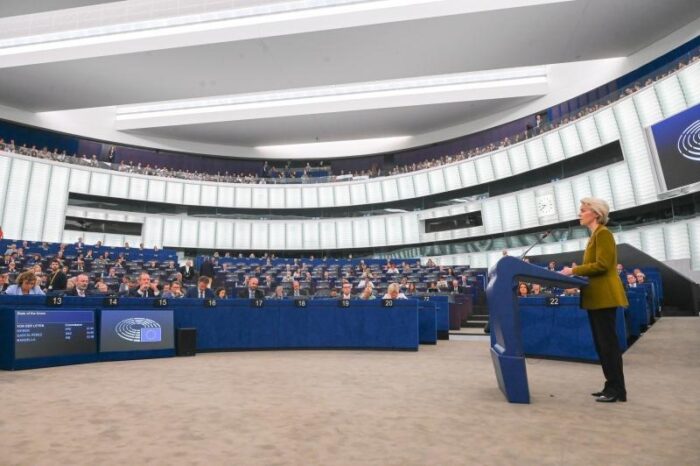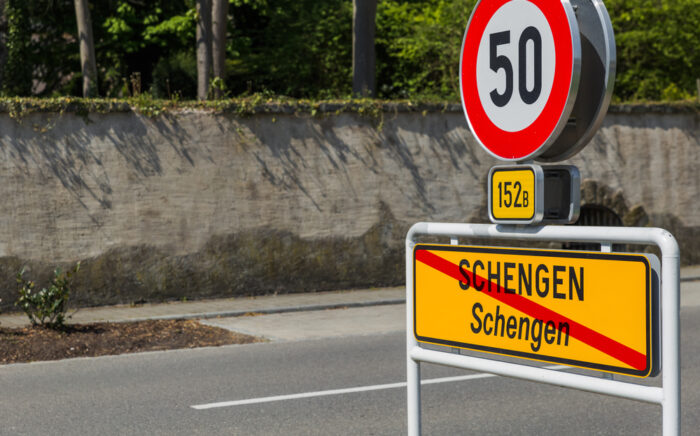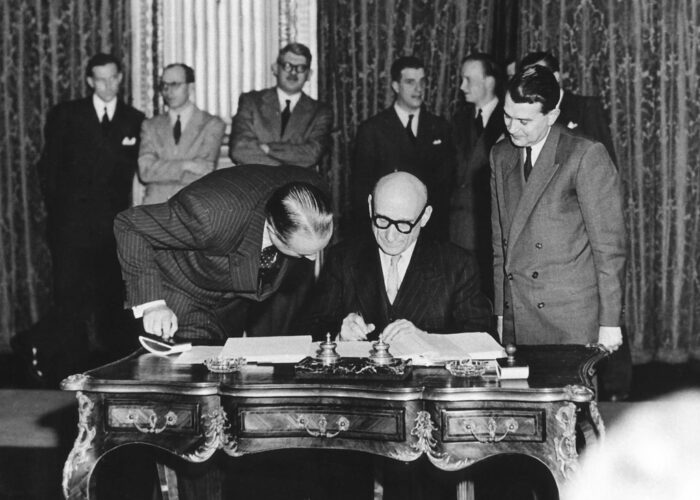The Progressive Post
The wheels are coming off

Frans Timmermans has stepped down as executive vice president of the European Commission. Margrethe Vestager is expected to become the president of the European Investment Bank, and Jutta Urpilainen is going to join the competition to become Finland’s new president. These commissioners used to be political heavyweights in their home countries before moving to Brussels, which was certainly good for Europe. But their simultaneous departure more than one year before the end of the mandate of this Commission, added by the constant speculation about Ursula von der Leyen preparing for Jens Stoltenberg’s succession at the helm of NATO, the Commission’s leadership capacity is dramatically dropping. It gives the impression of the wheels coming off, and that the achievements of this cycle on major policy fields could remain incomplete.
Brussels implosion
The merits of the von der Leyen Commission have to be recognised. They launched the Green Deal as an emblematic programme, orchestrated the counteroffensive against the coronavirus, and fostered solidarity among EU countries and citizens to ensure that the continent can rise to the challenge of Russian aggression and support Ukraine. However, neither of these issues has been one-dimensional, and the complexity of the current situation in particular seems to be overwhelming for them.
It might have just been a bon mot after Jean-Claude Juncker’s ‘political Commission’ for von der Leyen to call her team the ‘geopolitical Commission’ but they really wanted to fill this phrase with meaning, at least for a while. Contrary to what all this discourse promised, however, the ambition started to fade, and the concept of strategic autonomy has been phased out. The whole discourse about strategic autonomy emerged a decade ago from the perception that Europe was punching below its weight in international relations. It seems that finally, the solution to this mismatch is to reduce the weight of Europe to match its punching capacity.
Today, there are great concerns about the future of the European business model and its social model too. Ten years ago, the development of the social model was the greater concern, today it is the survival of the EU’s business model. And the Commission is standing there, before the simultaneous supply and demand side shocks, as Buridan’s donkey: hungry for markets, thirsty for resources, and just perplexed about how out of so many good intentions so worrisome outcomes can follow.
In particular, there seems to be a lack of ideas about how to match the global challenge from the US and China in the fields of industrial policy, in response to the US Inflation Reduction Act and in support of the de-risking effort. Clearly, more common tools (and investment capacities) would be needed, but anything new can only come from the next leadership, if at all. Just over one year ago, the Conference on the Future of Europe provided a platform for ambitious endeavours, perhaps even big leaps in the process of European integration. This momentum seems to have been wasted, and the tyranny of the status quo prevails.
Choices of the centre-right
Most observers would say that the right and the far-right are ahead of the left today in terms of strategic answers and choices – even if these are mainly about their own positioning rather than promoting the common interests of the Europeans. However despicable from a progressive point of view, the centre-right has chosen a strategy which is essentially about competing with the extreme right for the right-populist vote by turning against migrants and stepping back from the green agenda. Experience shows that by doing this in most cases the centre-right has actually paved the way for the further rise of the far-right.
Not that there would be an obvious recipe against far-right shifts and autocratisation in Europe or elsewhere in the world. However, the EU turned out to be spectacularly ineffective in the protection of the rule of law in Hungary and Poland in the past decade. Jarosław Kaczyński’s government is playing a geopolitical game assuming that by becoming a strong actor in Eastern policy, and a close buddy of Washington, their campaign against the rule of law would not matter anymore. However, the EU would risk losing its identity and cohesion by going down that alley.
The Spanish national election outcome in July might signal that the far right has peaked, but all over Europe it is peaking at a very high level, and generating a large-scale backsliding on rights. Arguably, it is not so much the absolute level of far-right support that is the main concern today, but the nexus between the centre-right and the extreme right-wing forces. Diverse patterns can be observed here. Under pressure from the extreme fringes, the UK Conservatives reprofiled themselves into a populist hard-right party, following the pattern of the US Republican Party. In Germany, the CDU-CSU is leading the polls, but they are in strategic agony, with their current leader Friedrich Merz not being able to outline an unequivocal answer to the AfD challenge.
Two parliamentary cycles ago, the flexibility of the centre-right led to the decision to tackle the populist wave by effectively joining it in 2014, and to pretend that by slimming the EU agenda, the source of citizens’ irritation could be removed. These tactics also helped the failed economic policies of the centre-right to survive, and the roofs of the Economic and Monetary Union were not repaired when the sun was shining. Now, they are keen to revive the controversial set of fiscal rules that clearly failed Europe when they were meant to be enforced, and which are considered outright obsolete since the Covid-19 pandemic.
The current global economic situation illuminates perfectly why the centre-right policy has indeed been the fundamental problem, while the occasional upswings in the support of the far right is a symptom. During the euro area crisis, German finance minister Wolfgang Schäuble and his like-minded friends prioritised creating current account surpluses everywhere as opposed to growing the European economy and deepening the single market. The consequence is not only a smaller share and more vulnerable position of the European economy in the global system, but also a misunderstanding of the German surplus by the rest of the world (the US in particular), and eventually an unfair distribution of the costs of economic warfare that has hit Europe in the past two years.
Towards a progressive strategy
In the face of the fading of the Commission in Brussels and the right-wing manoeuvring at all levels, the Social Democratic strategy is emerging slowly (one could say too slowly). But it is for Social Democrats, and for nobody else, to put together again the progressive agenda of the EU institutions. Until this happens, there are important tasks ahead, both at EU and national levels.
Ending the cycle of defeats at the national level must be a priority, even if in many cases the shifts to the right did not take place at the expense of Social Democrats, but of their actual or potential coalition partners. In the past decade, Socialists in different countries managed to form and lead progressive alliances, like in Spain or Finland, and the know-how of this ought to be shared. On the other hand, we also need to draw lessons from electoral misfortunes, like in Greece or Poland. Reflection is required about the consequences of party splits, like in Italy or Croatia. In some countries like Czechia, Hungary and Slovenia, centrist parties led by rich businesspersons pulled out the voting base from the Social Democratic parties, and the answer to such tendencies also must be worked out. In certain cases, in France for example, a long-term recovery strategy is warranted.
Whether we speak about countries where progressives are leading, like Portugal, or where they are struggling, like Bulgaria, the crucial task is to reinforce the centre-left’s social base, especially among those hit by the cost-of-living crisis and fear the consequences of a never-ending war. As we are approaching the European Parliament elections of 2024, the progressive agenda will need to highlight that the EU can actually offer the solutions to most problems our voters are concerned with, as long as the right leadership is elected. Contrary to stereotypes, and occasional indifference towards European elections, it does matter how many people vote and what leaders are installed as a result of their choices.
While a defensive fight on issues like climate and migration will be inevitable, the centre-left will have to win this-election on their home turf: promoting ideas and policies for protecting the living standards of Europeans. Needless to say, it will not be enough to recognise the scale of the cost-of-living crisis and talk about it. Progressives aspiring for EU influence and offices will have to, sooner rather than later, identify some key parts of social safety nets where EU action (either legislative or budgetary) can provide effective reinforcement in the next cycle, and make that a centrepiece of their programme. Once passing the theoretical parts, the new Commission will have to create the tools of an EU industrial policy in practice, for the protection of the climate and to deliver sustainable employment at the same time. The EU will also have to identify the institutional clogs that hinder EU enlargement and prepare a targeted treaty change for solving those.
It may be the case that the next cycle will be one that tests the added value of the EU more externally than internally. When the next Commission is formed, its president should designate a commissioner to prepare for the accession of the Western Balkans and another one for the reconstruction of Ukraine. Other critical tasks will be to fill the European Political Community with real content, step up efforts for the reinforcement of multilateral institutions and prevent a major war in Asia. Just like Asian countries can play a significant role in reaching a ceasefire between Russian and Ukrainian forces, the EU can be instrumental in deescalating the sinister military dynamics in Asia. In other words, as the transition to a new global order continues, Europe will be either at the table or on the menu. This will certainly play a major role in the political debates of the coming year, and we should not underestimate the awareness of the high stakes among the ordinary citizens.
Photo credits: Shuttterstock.com/Alexandros Michailidis




